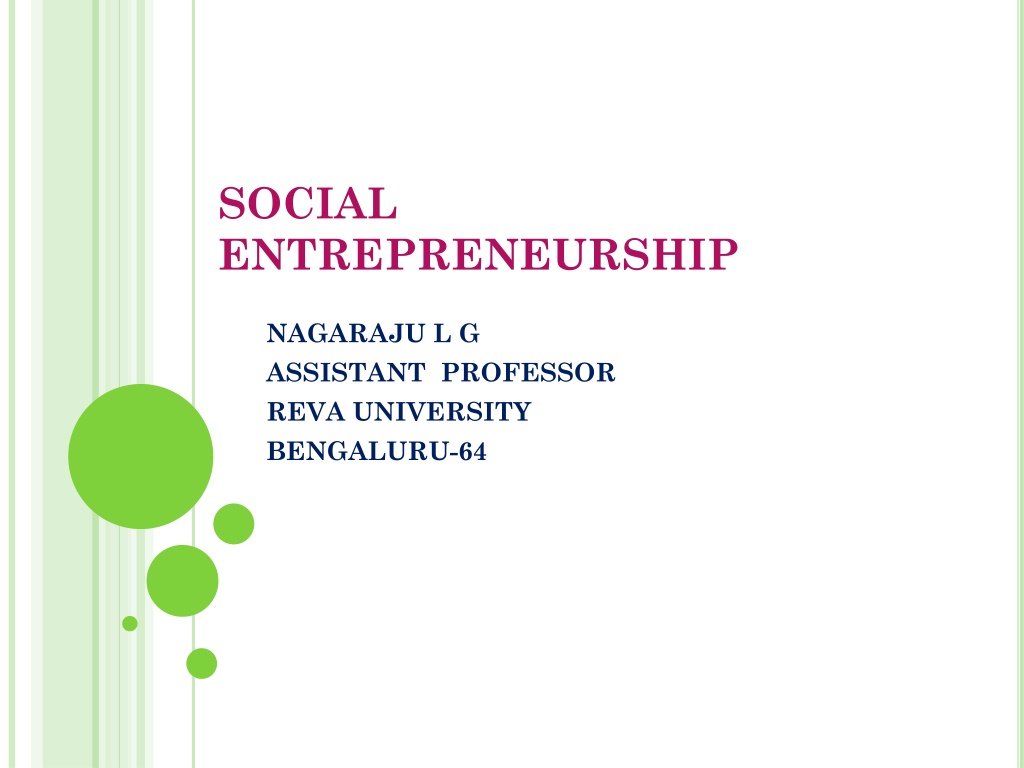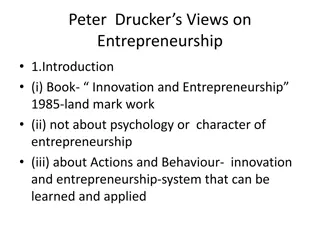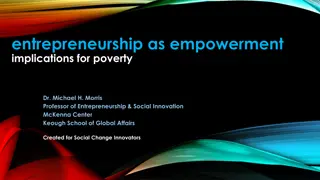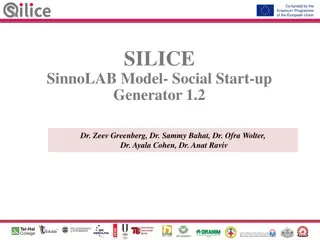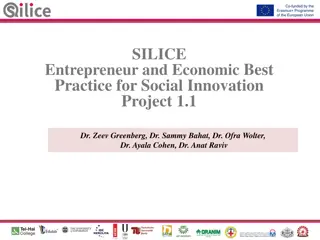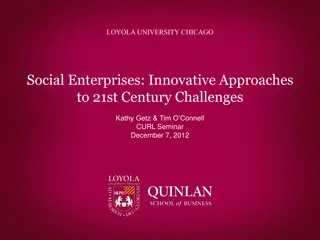Understanding Social Entrepreneurship, Social Enterprise, and Social Innovation
Social entrepreneurship involves creating sustainable social impact, social enterprises address challenges in critical needs sectors, and social innovation focuses on developing effective solutions to social and environmental issues. These concepts emphasize creating social value while engaging with various sectors and communities, ultimately benefiting society as a whole.
Download Presentation

Please find below an Image/Link to download the presentation.
The content on the website is provided AS IS for your information and personal use only. It may not be sold, licensed, or shared on other websites without obtaining consent from the author. Download presentation by click this link. If you encounter any issues during the download, it is possible that the publisher has removed the file from their server.
E N D
Presentation Transcript
SOCIAL ENTREPRENEURSHIP NAGARAJU L G ASSISTANT PROFESSOR REVA UNIVERSITY BENGALURU-64
SOCIAL ENTREPRENEURSHIP Social entrepreneurship as innovative, social value creating activity that can occur within or across the non-profit, business, or government sectors(James AustinHowardStevenson-2006),Social entrepreneurship is process of creating sustainable social impact(R El entrepreneurship in modern altruistic form of entrepreneurship that focuses on the benefits that society.(Williams, John, and Tan, Teck-Meng- 2005).SE, entrepreneurial activity with an embedded social purpose (Austin, Stevenson, & Wei-Skillern, 2006) Ebrashi -2013) Social society offers an
SOCIAL ENTERPRISE SE encompasses the activities and process undertaken to discover, define and exploit opportunities in order to enhance social wealth by creating new ventures or managing existing organization manner(Shakar A. Zahara 2009) Social enterprises are predominantly for-profit private sector small businesses that engage with the low- income population to address challenges of access and affordability in critical needs sectors.(Indian social enterprise Landscape report) in an innovative
A social enterprise is a business with primarily social objectives whose surpluses are principally reinvested for that purpose in the business or in the community, rather than being driven by the need to maximise profit for shareholders and owners (G Giulia- 2002) Social enterprises are a sub set of such activities in which commercial models are used as the vehicle by which achieved(Nicholls 2006b; Thompson 2008) social objects are
SOCIAL INNOVATION AND SOCIAL CAPITAL Social a efficient, sustainable or just solutions and for which the value created accrues primarily to society as a whole rather than private individuals.( Standford Innovation review-2012) Social innovation is the process of developing and deploying effective solutions to challenging and often systemic social and environmental issues in support of Malhotra, Clavier). innovation social as that a novel more solution effective, than existing to problem is social progress.(Soule,
SOCIAL CAPITAL Social Capital ,Networks together with shared norms, values and understandings that facilitate co-operation within or among groups.(OECD 2012) Social capital ,those functioning social groups that include such things as interpersonal relationships, a shared sense of identity, a shared understanding, shared norms, shared values, trust, cooperation, and reciprocity factors of effectively
WHY SOCIAL ENTERPRISES? Most of the social enterprises in India are very young because 57% of SE are below five years old and according to survey there are 2 millions SE are currently operating in to different domains Government policies relevant to SE and E among 26% policies remaining by Ministry of Finance(National Skill Entrepreneurship Policy 2015). (British council report 2016). in India, 39% of framed by MSME and
SE STATISTICS IN INDIA Maharashtra, West India (16%) followed by Karnataka, South India Telangana each accounted responses followed by Uttar Pradesh (7%), West Bengal (7%), Tamil Nadu (5%), Gujarat (5%), Bihar (4%), Odisha (4%), and Rajasthan (4%). The remaining 15% of the responses were spread across 12 states. The social enterprises address many issues ( Creating Employment, protecting environment, exclusion, supporting agriculture and allied activities, empowering education and addressing Financial inclusion) (15%). for 8% of the Delhi and Improving addressing health, social women, promoting
29.5% of Indias Population living below poverty line 33% of population without electricity in rural areas compared 6% in urban Areas, 16% of schools without functional girls toilet. 50 % employment in agriculture accounts only 14%of India GDP and 31% underweight children's under five years old, India is with 356 million young people also home to the world s largest youth population. India receiving philanthropic money as per new companies act 2013 company spend nearly CSR(SWISSNEX Report 2013) social enterprises also supporting to achieve sustainable development goals (Indian social enterprise Landscape study report 2018). global global 2% of profit as
WHO PROMOTES SE IN INDIA ? Intellecap, Villgro, UnLtd, Shujog, Germany s GIZ, the Asian Development Bank, the British Council, and Okapi have contributed significantly to the understanding and promoting of social enterprise in India these SE companies are registered as private limited companies, partnerships, and enterprises are supporting mentoring, conducting workshops business models and Grassroots innovations, providing research support and Impact investors are provide fund Funding(INR15 to l cr) Early stage funding(INR 1to 6.75cr) Growth stage Funding( above INR 6.75cr) year 2014 70% of impact investment in India concentrated on Micro finance and financial inclusions programmes. report(2015) The crowd funding and Philanthropy plays a vital role in booming of SE. Ashoka Deshpande Foundation Dasra, sole like ventures. access and The to above funding, refining SE training, investment. multi The impact Seed in stages like As per world Bank
HOW SOCIAL ENTERPRISES DIFFER FROM AND NGO S NGO s main funding is charity and donations ,its interests on alleviating immediate sufferings than deep social changes, redistributing income from have to have-nots, charity is not sustainable solution it just a donar funding like income redistribution SE founded through business model, its improves social conditions, sustainable entrepreneurship is innovation.(Acs, Zoltan J.2010) solutions, short-lived, social social not
SOCIAL ENTERPRISE ECOSYSTEM IN INDIA Ecosystem includes and Market- space, and policy makers. As per Indian social enterprise landscape survey2018 majority of social enterprise ecosystem in India based on urban locations, mostly infrastructure, ease sourcing social enterprises, and provide access to other networks development activities. However, with an increasing number of enterprises emerging from Tier II and Tier III cities and towns, enablers are expanding their services farther from the metros. Incubators, Accelerators, c0-working metros, to leverage better for funding and business
According to NASSCOM business incubators and country(90 established in academic institutions, 100 incorporate , government entities.) 40% located Mumabi, these incubators are adopted different models, the government policies like Start-up India, Scheme to support MSME, Technolog Incubation and development of Entrepreneurs. Mahindra Financial Solutions funded SustainEarth (INR 2 million/ 25,000) and FlyBird (INR 5 million/ 62,500) report 190 active accelerators in the and private and in Bengaluru also made many & Mahindra
DIFFERENT DOMAINS OF SOCIAL ENTERPRISES Affordable Housing Tourism Education Agriculture, Fisheries and Dairy Skill Development Social Enterprise Sectors Energy and Clean Technology Forestry and Environment Water and Sanitation Healthcare Non-Farm Livelihood Food and Nutrition
SE IN AGRICULTURE DOMAIN Farmers in developing countries face tough challenges to their productivity, growth, and sustainability including lack of access to affordable financial products, limited knowledge of high-quality inputs, low usage of technology and market data, and poor market links across the value chain. social enterprises are implementing innovative solutions in the agriculture sector to serve them. Social enterprises are defined as private for-profit, nonprofits, or hybrid organizations that use business methods to advance their social mission. In the case of agriculture, social enterprises often address a particular pain point in the value chain, with the intention that the cost of their services or products will be recuperated by the benefits and income gains that farmers will achieve.
There are 230 agriculture social enterprises are operating India like, 31%-post harvest, 22%- Market linkages, 18%-cross-cutting, harvest, 11%-Harvest,3%- sectors.(Ministry of Agriculture) Krishi Unnati Yojana , National Agriculture market and state/ UT Agriculture Produce and Livestock marketing act, Paramparagat Krishi Vikas Yojana, Modified National Agricultural Insurance Scheme making policies in SE in AG sector. 15%-pre and poultry dairy
SOCIAL ENTERPRISES AND INCUBATORS Villgro Foundation, IIT Madras, Deshpande foundation, UnLtd. Dasara, Gross Roots Business Fund, Aavishkar, Stratup India Be fund India, Ashoka India Social Enterprises Agrosaw, Dhaanya Seeds, Skymet ,One Ulink Organics, Siri Flybird Innovations, Vdrone Agro Eruvaka, Technologies, Chasing Sun, Alma Nourisher,the Green Salute, Amul, Milk Mantra, Cowbos desi, team desiMilk. Kisan raja, Agro star,Digital green Akasha Gange etc..
SE MODELS IN AGRICULTURE Accessing Finance Non-Bank service providers Financial Intermediaries Indexed Based Micro Insurance Improving productivity ICT Extension Non-ICT Extension Productivity Enhancement Increasing Post harvest value Post Harvest Service providers Storage Solutions Creating Value Chain and market Linkages Direct-from-Farm Market Models Multi-stakeholder Platforms
